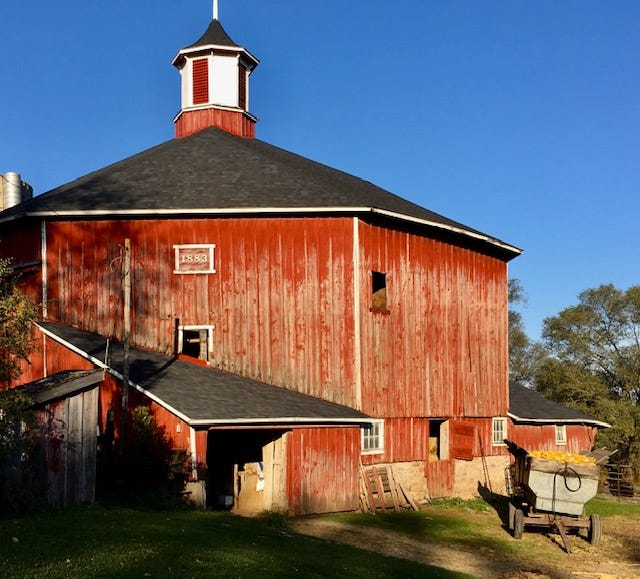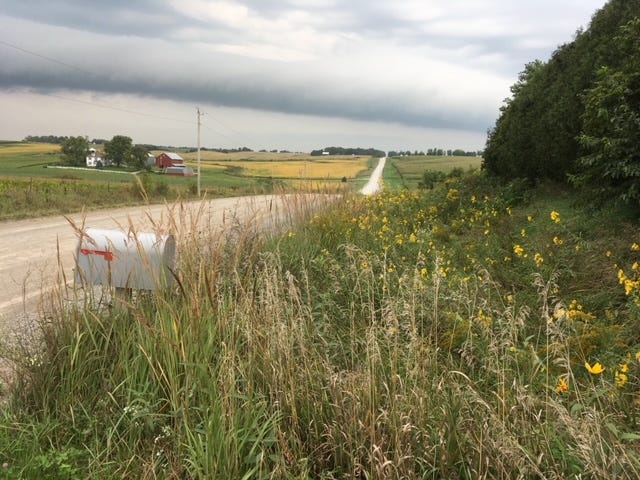The cookstoves rolled down the road in front of my house. It was June, time for Joe and Clara’s wedding. One, two, three, four cookstoves passed by, tied down to wagons, pulled by tractors or teams of horses. The stoves creaked and groaned over the bumps in the road, then were gone around the corner where my two Amish neighbors would marry in the morning in the barn. Five, six, seven, eight.
The bride’s aunts would gather outside in the evening by lantern light to begin rolling out the pie crusts and stirring together the ingredients. Lemon meringue, chocolate, rhubarb and shoo-fly pie fillings. The aunts would cut lard into flour in bowls on folding tables in the yard, their husbands stoking up fires in the stoves. Nine, ten, eleven, twelve. Then, the aunts would lift their creations into their stoves, a sweet aroma wafting over the cornfields.
With the crow of the rooster, the aunts would have made enough pies to feed the 500 wedding guests at least one piece with their six-course meal. The bride’s siblings and cousins would be the servers, hustling around their assigned tables in the immaculately clean machine shed, resting platters of cheese and raw vegetables in front of the guests. Next, would come cups full of nuts, and a small salad with a pear half placed in the middle of a bed of lettuce.
Then plates filled with chicken, mashed potatoes and beans would appear. Bread baskets would be passed down the lines with small pats of butter. Once the water glasses were refilled, coffee would be handed around, the servers balancing the china cups on their saucers. And then, carts filled with pies, would be wheeled toward the tables, the guests taking delight at the flavors set down before them.
Years ago, I’d made a big faux pas at my first Amish wedding. I’d entered the barn and sat in the back on one of the low wooden benches. The previous night, the father and brothers of the bride had slid the benches out of their slots in the wagon, unfolded them, and set them up in the barn in neat rows divided by a center aisle. The wagon held not only the benches but silverware, tablecloths, napkins, plates, cups and saucers for all occasions, each in its own cubby hole. The bench wagon circulated, holding everything in its place, from farm to farm for church services, weddings and funerals.
Men, seated on the benches in the front of the barn were chanting the wedding vows in German, slowly, in deep resonant voices, one syllable held for at least seven or eight notes. Neighbors poured in in their black Sunday best, the men’s jackets fastened tightly at their chins, the women’s dresses pressed and pinned at their waists. Then men veered off to the right and sat together, the women to the left. Gradually, I realized I was on the wrong side of the barn, but no one said a word to me. They just nodded when they passed. I rose and scooted over to the bench on the women’s side, settling in for a three-hour service in German and English, including the bride and groom, dressed in black, making their appearance, saying their vows and pronouncing themselves married.
A sermon followed from the bride’s father, his voice cracking, tears sliding down his cheeks. Unembarrassed, he simply pulled out a handkerchief, blew his nose, and continued. He told the bride and groom to love and care for each other, to understand that they were forming a new family, that they were leaving their own nuclear families and were to find refuge in one another. Another man arose and spoke in Dietsch, another in English, the words stretching toward noon, my back aching, feet tucked under the low bench. Finally, the bride and groom made their exit in a quiet, reserved way, without musical accompaniment or loud processionals.
I left with the crowd and wandered down the road to my home.
“Why did you leave the wedding?” the bride’s father asked me later that week.
“Where did you go after the service?”
“Home,” I said. “Where was I supposed to go?”
“You didn’t stay for dinner.”
“Dinner? I didn’t know about any dinner. Where was the dinner?”
“In our other machine shed. Next time, please stay for dinner.”
So, I stayed for dinner at the next neighborhood wedding, a full-course dinner complete with freshly baked pies. After we’d eaten a sumptuous meal, the young people began a game of volleyball in the yard. Again, I found my way home.
Then, a few days later, a family member confronted me, this time the mother of the groom.
“We saw you leave after dinner. Why did you leave the wedding?”
“What? I’m sorry. I stayed and ate dinner.”
“No, there’s a supper at night.”
“Wait, and I’m invited to that, too?”
“Of course, and you can come back for breakfast, too.”
Wow, I realized that getting a wedding invitation was monumental. Three meals, fun and friendship. Maybe a volleyball game thrown in. A whole twenty-four-hour event. So, imagine my disappointment when a year rolled by and I didn’t get an invitation to a favorite neighbor’s daughter’s wedding.
“Hey,” I ribbed the parents. “What happened to my invitation?”
“Well, we invited 500 people, so we just had to cut it off somewhere. We had to cut it off somewhere.”
I know the field is limited in the Amish world. There are different sects of Amish and it’s not always easy to marry into a strange community. And most Amish are related, so you have to mix it up a little, perhaps look for a mate in a different state.
Many years ago, a twenty-year-old neighbor was without prospects here in Freemartin Town. So, her grandparents went to Florida for the winter and hired two handsome young Amish men from Indiana to come and paint the inside of their house while they were away. Then they hired their granddaughter to cook for the men. She could have her pick.
The winter was cold and snowy. The house was snuggly warm. The granddaughter made three meals a day. The house was painted by the end of February and when the grandparents arrived home in March there was something in the oven and a wedding on the calendar.
Sometimes, my neighbors have to be a bit creative in finding a mate. Joe, the carpenter, became engaged to Clara, and I was cut out of that invitation, too. Oh, well. I was happy for Joe. His first wife had a long, suffering illness, and when she finally passed away, Joe became thin and grim, his straw hat pulled down over his eyes. He sat at his desk in his office of the lumber yard going over his books, making marks in his ledger, rarely even looking up. Sometimes, he wasn’t there at all.
Once, my garden gate was rotting, the gate that he had made for me thirty years before. I simply lifted it off the hinges and drove it down to Joe’s, only to find his office empty and this message on his desk:
Gone to a wedding in Ohio. Take what you want and write it down in this notebook.
I will send you a bill.
I left my rotten gate propped up against Joe’s desk and wrote in the notebook:
Joe, can you make me a new gate, please? Will pick up next Saturday.
A week later, I stopped in, and there was a brand, new gate, an exact replica of my old one, leaning against his desk. Joe nodded to me, a faint smile across his face.
“How was the wedding in Ohio, Joe?”
“Good. And it looks like there’s going to be another one.”
Joe told me he would be marrying Clara, one of the “maiden ladies.”
Clara was about twenty years Joe’s junior, and a few weeks later, after all the pies had been eaten and the cookstoves hauled home, I found her working in the office, doing paperwork beside Joe, his hat resting squarely on his head. She was small and lively, as chatty as Joe was quiet.
“Congratulations!” I said.
Clara thanked me. We commented on the weather and the repairs that a crew was making on the highway. Joe went in and out of the office, bringing me a box of nails that I wanted to buy.
“Well,” Clare hesitated, glancing at me, then at Joe. “Some people in the community think that there is too much of an age difference.”
“Between you and Joe?”
“Yes.”
“Why should you care?” I asked. “It’s hard enough trying to find a mate. Why should age matter?”
“Well . . .” Clara began.
“I mean really.”
“It seems to matter to other people.”
“All that matters is if you love each other.”
I turned to Clara.
“Oh, I do.” Clara smiled.
I turned to Joe.
He smiled, pushing his hat back on his head.







Thank you for opening a window into this world. Some of their problems remind me of those faced by the Micronesians in eastern Iowa.
Can’t beat a good love story! Especially one with pie in it -- a whole lotta pie!